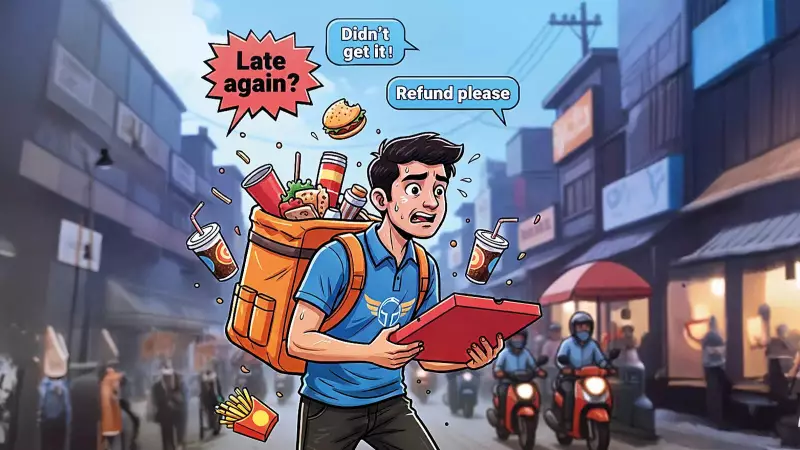
Behind the seamless tap that brings food to your doorstep or a cab to your location lies a world of systematic exploitation that India's gig workers endure in silence. These delivery executives and drivers, who form the backbone of our digital economy, face daily horrors that never make it to your app notifications.
The Invisible Scars of 'Flexible' Work
Across major Indian cities, gig workers share chillingly similar stories of being cheated, abused, and trapped in a system designed to benefit platforms while leaving them vulnerable. From manipulated ratings to withheld payments, the very apps that promise 'flexibility' often deliver financial uncertainty and mental trauma.
Financial Traps and Phantom Orders
Many delivery partners report sophisticated scams where customers place genuine orders only to later claim non-delivery, resulting in deducted payments from the worker's earnings. One Zomato delivery executive from Bengaluru described how he lost ₹800 from a single shift due to such false claims.
"They order, receive the food, then mark it as undelivered. The company always sides with the customer, and we lose a day's earnings," he shared, requesting anonymity for fear of being blacklisted.
The Rating System: A Weapon of Mass Termination
The much-touted rating system has become a tool of oppression rather than quality control. Workers live in constant fear of being deactivated from platforms for reasons beyond their control - traffic jams, restaurant delays, or simply encountering unreasonable customers.
- Delivery executives can be terminated for ratings dropping below 4.2/5
- No proper appeal process or human contact for resolution
- Algorithmic decisions made without context or consideration
Verbal Abuse: The Daily Price of Employment
Perhaps the most damaging aspect is the constant verbal abuse and public shaming. Multiple workers described being shouted at in public, subjected to casteist slurs, and threatened physically over minor delays or restaurant errors.
"Customers forget we're human beings with families and dignity," said a Swiggy delivery partner from Delhi. "They scold us like we're their personal servants, not service providers."
The Mental Health Toll
The psychological impact of this constant stress is devastating. Many workers report anxiety, depression, and sleep disorders, but continue working due to financial pressures and lack of alternatives.
- Constant fear of rating drops leading to income loss
- No job security or benefits despite full-time hours
- Social stigma and family pressure to find 'proper jobs'
Platform Accountability: The Missing Link
While companies tout their contribution to employment generation, workers say the platforms have systematically avoided responsibility. Grievance mechanisms are either non-existent or designed to frustrate rather than resolve issues.
Customer service numbers connect to automated responses, and human intervention requires navigating multiple layers of bureaucracy that most time-pressed workers cannot afford.
A Call for Systemic Change
As India's gig economy continues to expand, experts emphasize the urgent need for regulatory frameworks that protect workers while maintaining platform flexibility. The current model, while profitable for companies, is unsustainable for the humans who power it.
The stories emerging from India's gig workforce paint a troubling picture of modern exploitation - one where technology has become a tool for evading traditional employer responsibilities while maximizing corporate profits.





